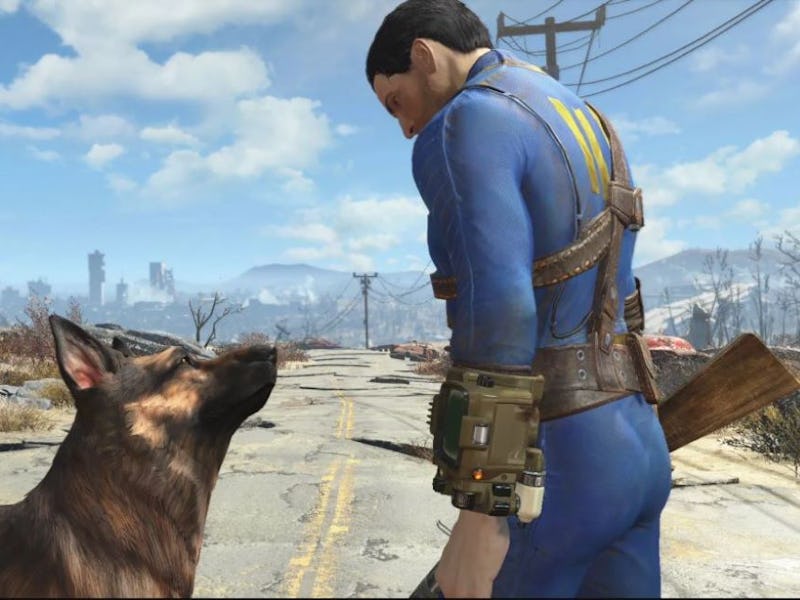10 Years Later, Fallout 4 Is Secretly Bethesda’s Greatest Achievement
Build it and they will come to build more.

Success isn’t easy. There’s the obvious challenges of actually achieving success, but once you’ve created a hit TV show or blockbuster movie, the clock starts ticking on that nefarious “what’s next?” question. Now the measurement of success isn’t just how something compares to its peers, but how it compares to all prior achievements. This is especially daunting for video games, where a smash hit can define — or destroy — a studio’s future. But 10 years ago, one of gaming’s most influential studios managed such sky-high expectations and delivered one of its greatest games.
After Bethesda Game Studios conquered gaming with The Elder Scrolls V: Skyrim in 2011, all eyes turned to its follow-up to the studio’s other massive franchise: Fallout 4, which launched 10 years ago today. This new Fallout leaned further into the retro-futuristic aesthetic, wry dark humor, and survivalist noir fans loved, but innovated in ways that made it Bethesda’s best entry in the franchise.
Fallout 4 put us in the Commonwealth, a lived-in Bostonian ruin of broken statues and improvised settlements. Bethesda amplified the series’ sense of exploration and environmental storytelling, inviting players to tear apart the world and reassemble it through scavenging, weapon crafting, and, controversially, settlement building.
While initially contentious, Fallout 4’s settlement system is arguably Bethesda’s greatest innovation in dealing with a uniquely Bethesda issue: too much stuff. One of the joys of Skyrim is how deeply immersive the physical world is, as you can pick up every cup, bone, and wheel of cheese. But seasoned Skyrim vets know that, by the endgame, you’ve likely gathered a half dozen houses’ worth of useless junk.
Fallout 4’s crafting system lets players break all that junk down into useful components like wood, copper, steel, and glass. Since you’re always upgrading settlements and gear, you always need materials. This means that even a player who’s strong enough to one-shot a Deathclaw is still excited to find a coffee mug because they need the ceramic for something, which adds value to a wasteland that would otherwise feel cluttered but worthless. Bethesda anticipated and solved one of its biggest game loop problems.
Fallout 4 understands that big metal suit + big metal weapon = fun.
Fallout 4 moved millions of units to become one of the most-played open-world titles of its generation, as gamers who might previously have shied away from dense RPGs latched onto its unique aesthetics and open-world anarchy. However, long-time fans and some critics lamented its flattened role-playing depth. Dialogue choices were simplified, reducing player projection and the franchise’s famous sense of moral ambiguity. Technical glitches at launch, while par for Bethesda’s reputation, also tempered enthusiasm.
But Bethesda stayed the course by patching bugs and doubling down on moddability, shipping Creation Kit tools that fostered an enormous user-created ecosystem. Mods ranged from simple UI tweaks to total conversion overhauls, and the mod community became one of Fallout 4’s most enduring legacies, keeping the title relevant years after release.
Mods, DLC, and a robust settlement system added dozens of hours to an already lengthy game.
Fallout 4 left its fingerprints all over the industry. Its crafting and workshop systems popularized a “pull everything apart and put it back together” loop that many subsequent survival and open-world titles refined or borrowed. Scavenging as progression, modular weapon and armor upgrades, and player-driven base construction became staples in genres beyond single-player RPGs.
The game’s success also helped normalize the idea that big-budget RPGs could be tools for broader player expression rather than purely narrative vehicles. This shift encouraged other studios to invest in systems-driven design. Nintendo’s Breath of the Wild launched a year and a half later, and it’s easy to draw parallels in the player agency found in both titles.
Fallout 4 isn’t universally hailed as the franchise’s best narrative, but it stands as its most catalytic modern chapter: a title that broadened its audience, introduced genre-defining mechanics, and forced a conversation about how scale, accessibility, and depth can coexist. It’s messy, generous, and occasionally infuriating, and that contradictory energy is what made it a success.